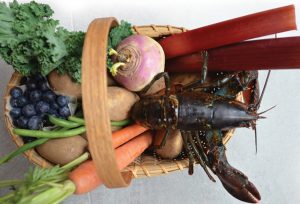MSWC Talk – Community Food Councils as Vessels for Coordinated Food System Change
Highlighted Talk from the 2019 Maine Sustainability & Water Conference
Community Food Councils as Vessels for Coordinated Food System Change
Session: Sustainable Practices and Decision-Making Across Diverse Food Systems in Maine
The development of sustainable food systems in a changing climate and evolving globalized society is an ever more critical challenge. Food systems of production, distribution and consumption are embedded within issues of access, equality, sovereignty and justice that affect producers and consumers alike.
Food producers attempt to harvest and distribute their products sustainably while trying to remain competitive within their markets, as consumers strive to purchase more locally-sourced foods in affordable and convenient ways. Across food systems in Maine, work is being done to better understand these systems and address current challenges.
Drawing upon diverse disciplines, industries, and stakeholders, this session looked at the intersection of scale and sustainability as well as highlighting some of the present work, progress, and applied solutions within the broader local food movement in Maine to achieve a more sustainable food system.
Throughout Maine, Community Food Councils are advancing locally responsive food systems change that prioritizes some of the most critical aspects of a just and sustainable food future for our state. This talk highlighted three Community Food Councils and their work on racial equity, regenerative agriculture, and waste reduction. Participants learned about these individual efforts and how they are woven together into a coordinated and mutually supportive movement by the Maine Network of Community Food Councils (MNCFC).
Brie Bowman is coordinator for the MNCFC. She spoke about how councils can serve as vessels for coordinating food systems change across the state.
The state food councils, of which there are currently 10 representing over 200 towns in nine counties, are community-based organizations that are responsive to local needs and capacities. In some places they are nonprofits while in others they are volunteer efforts with unique structures and priorities. Councils operate at town, municipal, and county levels.
Councils are an important means of promoting education, building communities around local food systems efforts, and providing unique spaces where cross-sector collaboration can happen. Sometimes the councils are the only space where people have the opportunity to meet and discuss a shared focus or interest.
“The councils comprise a community-based coalition that helps build and promote more resilient food systems,” Bowman said. “And this is done through a number of ways focused on a variety of topic areas building connections across stakeholders to improve health, access, natural resource protection, economic development and support agricultural production in the area they operate.”
Bowman added, “And we focus on building the capacity of local-level food systems efforts through coordination, collaboration, and resource sharing that facilitates easy communication between disparate efforts across the state.”
Those participating in food councils include nonprofits, retailers, land trusts, fishermen and farmers, healthcare and service providers. Projects developed by councils include gleaning and distribution projects that work to close the loop in a local food system between waste (e.g., unharvested produce left in fields), community health assessments, preservation of farmland, farm-to-school, and local access to seniors.
“Councils are also important for their ability to quickly spread innovation and promote resiliency,” Bowman said. “For example, in the case of a staff turnover all the information stored in the network can then be quickly used to build someone else back up in the position.”
Adaptation, too, Bowman said, is key to the councils’ work “so they are always learning from one another how to do the work better or more creatively, or just seeing how others might be doing something in a different and innovative way.”
—David Sims
